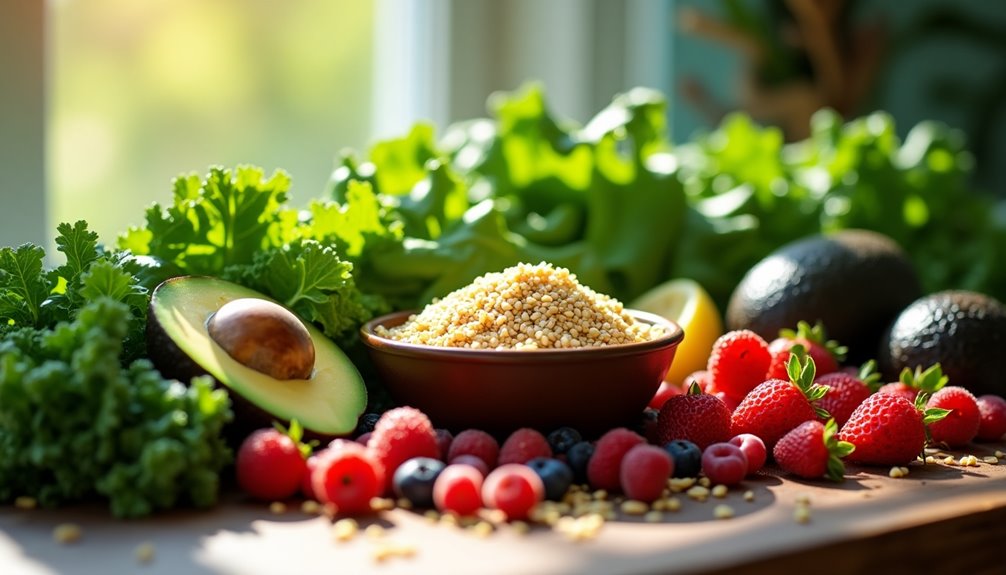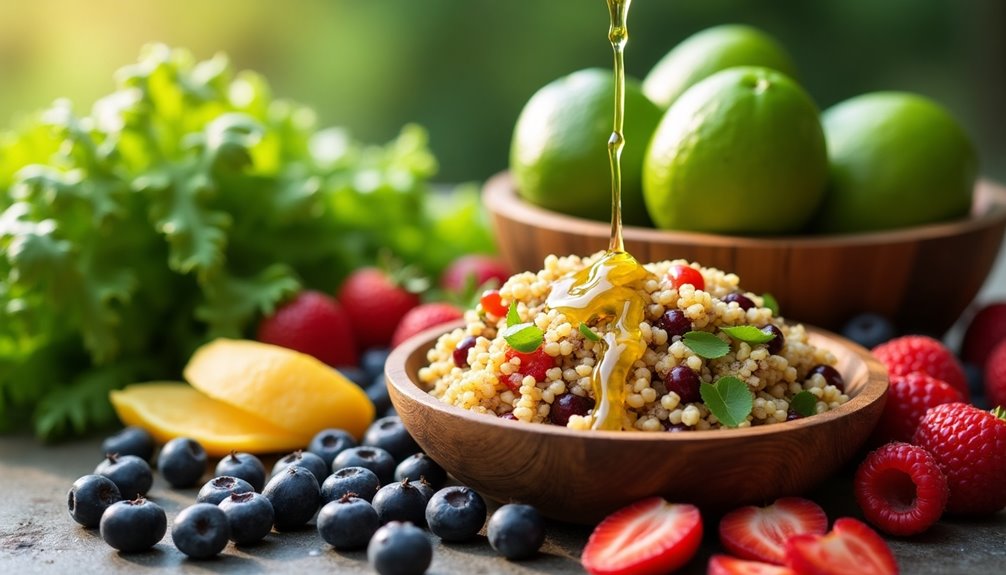A PCOS-friendly diet emphasizes whole, nutrient-dense foods that help manage your symptoms and balance hormones. Focus on including leafy greens, colorful vegetables, lean proteins, healthy fats, and whole grains. These foods help stabilize blood sugar levels and reduce inflammation. Key nutrients like omega-3 fatty acids, magnesium, and vitamins D and B support hormone balance and improve insulin sensitivity. Avoid sugary snacks, processed meats, and refined carbs, which can worsen insulin resistance. To make this diet effective, consider meal planning and prepping to stay organized and energized. You'll discover more strategies to enhance your PCOS management journey.
Key Takeaways
- Focus on whole foods like fruits, vegetables, lean proteins, and healthy fats to stabilize blood sugar and reduce inflammation.
- Incorporate omega-3 fatty acids, magnesium, and vitamin D to support hormone balance and improve insulin sensitivity.
- Limit sugary snacks, processed meats, refined carbs, and sugary drinks to prevent insulin spikes and promote better health.
- Plan balanced meals and snacks weekly to ensure a nutrient-dense diet and maintain energy levels throughout the day.
- Stay hydrated with water to enhance overall well-being and support metabolic functions in managing PCOS.
Understanding PCOS and Diet

Understanding the connection between polycystic ovary syndrome (PCOS) and diet is fundamental for managing this complex condition. As you navigate your journey with PCOS, it's important to recognize how dietary choices can influence hormonal imbalances and nutritional deficiencies that often accompany this syndrome.
PCOS is characterized by a range of symptoms, many of which stem from hormonal fluctuations. These imbalances can lead to issues such as weight gain, irregular menstrual cycles, and insulin resistance. By focusing on a balanced diet, you can help mitigate these symptoms and promote overall well-being. Eating a diet rich in whole foods, including fruits, vegetables, lean proteins, and healthy fats, can support your body in regulating hormones more effectively.
Additionally, many individuals with PCOS experience nutritional deficiencies. It's not uncommon for the lack of certain vitamins and minerals to exacerbate the symptoms of PCOS. By prioritizing nutrient-dense foods, you can help fill these gaps.
Incorporating foods high in omega-3 fatty acids, fiber, and antioxidants can be particularly beneficial. Following a custom keto diet plan can also provide tailored meal options that align with your health goals and dietary needs.
Key Nutrients for Hormone Balance

Achieving hormone balance is important for managing PCOS effectively, and specific nutrients play a key role in this process. Understanding your nutrient requirements can empower you to make informed dietary choices that support hormone regulation.
First, omega-3 fatty acids are crucial for reducing inflammation and promoting healthy hormone metabolism. You can find these beneficial fats in fatty fish like salmon, walnuts, and flaxseeds. Incorporating these into your diet can help alleviate some PCOS symptoms.
Next, magnesium is another vital nutrient that assists in hormone regulation. It helps to improve insulin sensitivity, which is important for managing PCOS. Foods rich in magnesium include leafy greens, nuts, seeds, and whole grains. Ensuring adequate magnesium intake can lead to better hormonal balance and overall well-being.
Vitamin D also plays a significant role in hormone regulation. Low levels of vitamin D have been linked to worsened PCOS symptoms. You might consider getting some sunlight or including fortified foods and fatty fish in your diet to boost your vitamin D levels. Furthermore, maintaining a healthy lifestyle by incorporating mind/body exercises can aid in reducing stress levels and potentially improve hormone balance.
Lastly, B vitamins—especially B6 and B12—are key for energy production and hormone synthesis. Foods like eggs, legumes, and whole grains provide these nutrients, helping your body function optimally.
Foods to Include in Your Diet

Incorporating nutrient-dense foods into your diet can greatly support hormone balance and overall health when managing PCOS. Prioritize whole foods that stabilize blood sugar and reduce inflammation. Start by including plenty of leafy greens, such as spinach and kale, which are rich in vitamins and minerals. Add colorful vegetables like bell peppers and carrots for their antioxidants. These choices not only nourish your body but also enhance your meals' visual appeal.
Whole grains, like quinoa and brown rice, provide fiber and slow-releasing carbohydrates that help regulate insulin levels. Include healthy fats from sources like avocados, nuts, and olive oil; these can improve your hormone function and keep you feeling satisfied. Lean proteins, such as chicken, fish, and legumes, are crucial for muscle maintenance and overall wellness.
When it comes to recipe suggestions, consider making a quinoa salad packed with veggies and a lemon-olive oil dressing or a hearty vegetable stir-fry with tofu. These meals aren't only delicious but also easy to prepare, making lifestyle changes more manageable.
Don't forget to include fruits, particularly berries, which are low in sugar and high in fiber. They can satisfy your sweet cravings while providing vital nutrients. By embracing these food choices, you'll be taking significant steps toward managing your PCOS effectively and feeling your best. Remember, every small change can lead to a healthier, happier you. Additionally, incorporating a plant-based diet can further enhance your overall health and hormone regulation.
Foods to Avoid for Better Health

While it may be tempting to indulge in certain foods, avoiding those that can worsen PCOS symptoms is essential for better health. Your dietary choices can impact how you feel, manage your symptoms, and support overall well-being.
Here's a concise table to help you identify foods to steer clear of:
| Food Type | Reason to Avoid | Healthier Alternatives |
|---|---|---|
| Sugary Snacks | High sugar content can spike insulin levels. | Fresh fruits and nut-based snacks. |
| Processed Meats | Often high in unhealthy fats and preservatives. | Lean meats or plant-based proteins. |
| Refined Carbs | Rapidly converted to sugar, increasing cravings. | Whole grains like quinoa or brown rice. |
| Sugary Drinks | Contribute to weight gain and insulin resistance. | Water, herbal teas, or infused water. |
| High-Fat Dairy | Can exacerbate inflammation and hormone imbalance. | Low-fat or plant-based dairy options. |
In particular, be cautious with sugar substitutes, as some may lead to cravings or digestive discomfort. Opt for natural sweeteners like stevia or monk fruit instead. Additionally, avoiding high-carbohydrate bread can help prevent blood sugar spikes that worsen PCOS symptoms.
Meal Planning Tips for PCOS

Meal planning plays a crucial role in managing PCOS symptoms and promoting overall health. By organizing your meals, you can make sure that you're making choices that support your body while enjoying a variety of flavors. Start by creating a weekly meal plan that includes balanced meals and snacks, focusing on whole foods rich in nutrients.
When it comes to grocery shopping, stick to your list to avoid impulse buys. Choose fresh vegetables, fruits, whole grains, lean proteins, and healthy fats. These foods can help regulate insulin levels and reduce inflammation, key factors in managing PCOS.
Don't forget to incorporate some recipe ideas that are both delicious and PCOS-friendly. Think quinoa bowls topped with roasted veggies and grilled chicken, or a hearty lentil soup packed with greens. Batch-cook meals on weekends to save time during busy weekdays. This way, you'll always have healthy options on hand, making it easier to stick to your plan.
Also, consider preparing snacks in advance, like cut-up veggies with hummus or yogurt with berries. This not only satisfies hunger but also keeps your energy levels stable throughout the day. Additionally, drinking water from SlimCrystal bottles(https://example.com) can boost your energy levels even further, enhancing your overall well-being.
Frequently Asked Questions
Can Exercise Alone Improve PCOS Symptoms Without Dietary Changes?
Yes, exercise can improve your symptoms noticeably, but it's most effective when combined with dietary considerations. Regular physical activity boosts insulin sensitivity, helps manage weight, and reduces inflammation, which can alleviate symptoms.
However, without addressing your diet, you mightn't fully optimize your results. Finding a balanced approach that includes both exercise benefits and mindful eating can create a more supportive environment for your body, leading to better overall health and well-being.
How Can Stress Management Impact PCOS and Diet?
Managing stress can greatly impact your overall health and dietary choices. When you practice stress reduction techniques, like mindfulness, you're more likely to engage in mindful eating. This means you pay attention to what and how you eat, which can improve your relationship with food.
Are There Specific Supplements Recommended for PCOS Management?
Did you know that around 70% of women with PCOS experience vitamin D deficiency? To manage PCOS effectively, you might consider supplements like vitamin D, which can enhance insulin sensitivity and overall hormonal balance.
Additionally, some herbal remedies, such as spearmint tea, may help reduce androgen levels.
Always consult a healthcare professional before starting any supplements to verify they're right for you and fit your unique needs. You're not alone on this journey!
How Does Sleep Quality Affect PCOS Symptoms and Diet?
Sleep quality plays an essential role in managing your health. Poor sleep patterns can disrupt hormone regulation, leading to increased insulin resistance, which can exacerbate symptoms. When you prioritize good sleep, you help stabilize your hormones, making it easier to maintain a balanced diet.
Can Intermittent Fasting Help With PCOS Management?
Intermittent fasting can be beneficial for managing PCOS. It helps improve hormone regulation and enhances insulin sensitivity, which are vital for balancing your symptoms. By creating periods of fasting, you may reduce insulin spikes and promote weight management, both significant for overall health.
Conclusion
Incorporating a PCOS-friendly diet can be a game changer for managing symptoms and promoting overall health. By focusing on nutrient-rich foods and steering clear of processed options, you're not just fueling your body; you're nurturing your hormonal balance. Remember, every meal is an opportunity to make choices that support your well-being. As you embrace these dietary changes, think of yourself as the architect of your health, building a foundation for a brighter, more vibrant future.



